ACU HLSC220: Healthcare Ethics Debate Transcript - Moral Obligation
VerifiedAdded on 2022/08/23
|7
|1615
|17
Project
AI Summary
This debate transcript presents arguments for and against the moral obligation of citizens to participate in medical research and healthcare. The affirmative side contends that citizens have a duty to support healthcare workers and researchers, emphasizing ethical considerations and the potential for improved health outcomes. They argue that participation is a moral obligation, especially given the minimal risks involved and the benefits to the community. The negative side counters by highlighting individual autonomy, the right to make personal healthcare decisions, and the potential difficulties in ensuring health literacy for all participants. They emphasize the importance of respecting individual choices and the right to decline participation without moral judgment. The debate covers ethical principles, including autonomy and beneficence, and addresses concerns about potential risks and the need for informed consent. The speakers refer to various studies, ethical considerations, and legal rights. The transcript provides a comprehensive overview of the complex ethical issues surrounding citizen participation in healthcare and research, offering insights into differing viewpoints and the importance of ethical principles.
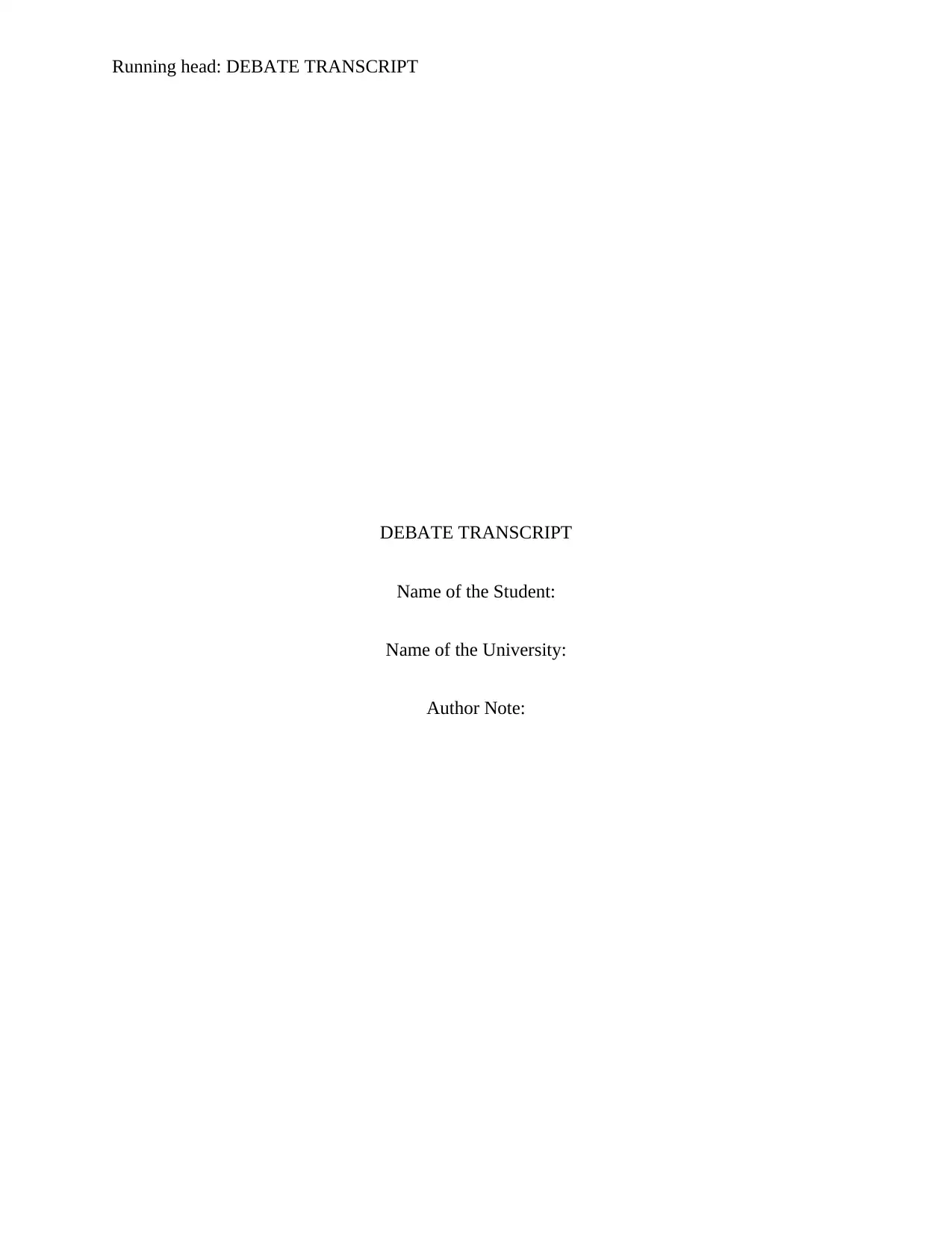
Running head: DEBATE TRANSCRIPT
DEBATE TRANSCRIPT
Name of the Student:
Name of the University:
Author Note:
DEBATE TRANSCRIPT
Name of the Student:
Name of the University:
Author Note:
Paraphrase This Document
Need a fresh take? Get an instant paraphrase of this document with our AI Paraphraser
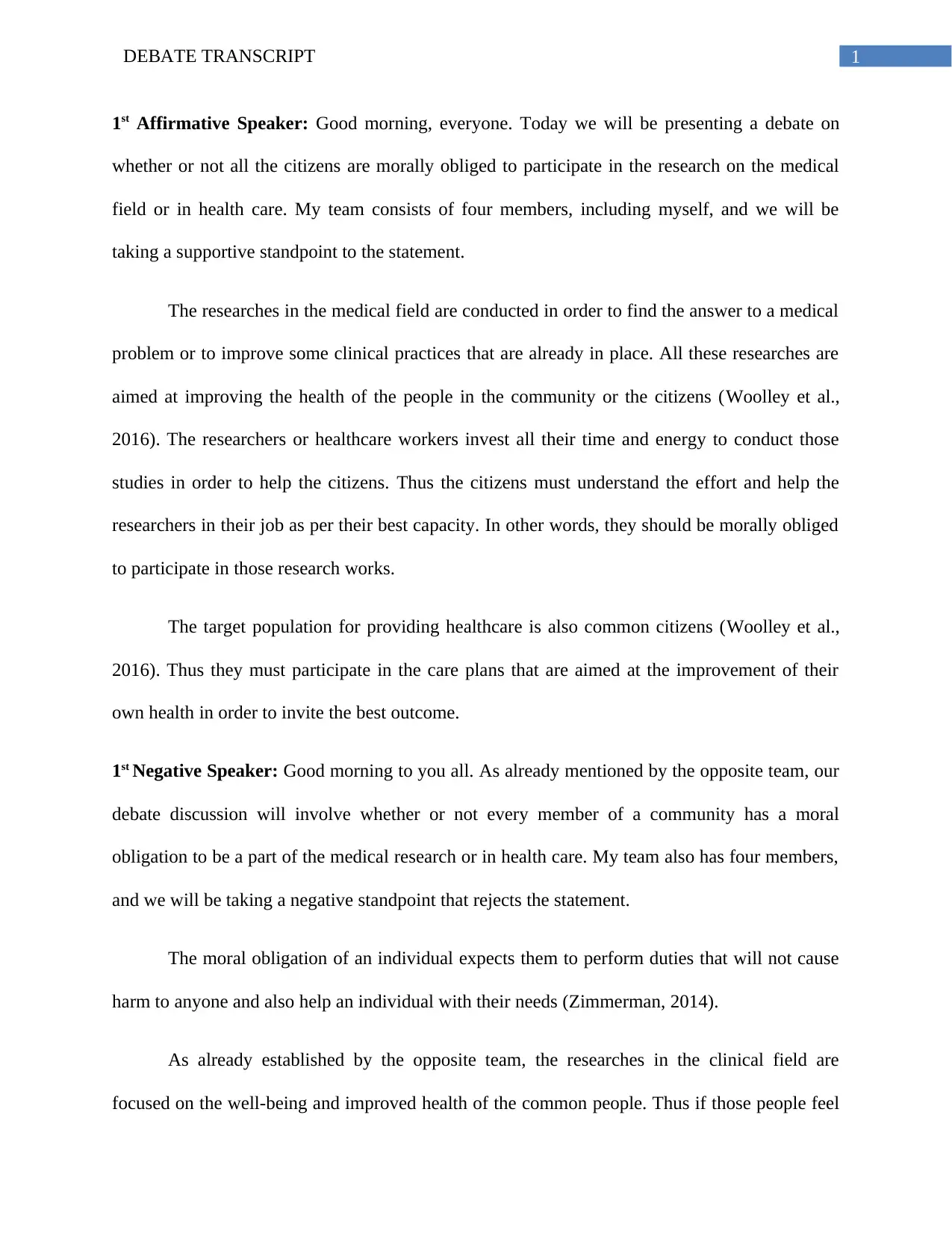
1DEBATE TRANSCRIPT
1st Affirmative Speaker: Good morning, everyone. Today we will be presenting a debate on
whether or not all the citizens are morally obliged to participate in the research on the medical
field or in health care. My team consists of four members, including myself, and we will be
taking a supportive standpoint to the statement.
The researches in the medical field are conducted in order to find the answer to a medical
problem or to improve some clinical practices that are already in place. All these researches are
aimed at improving the health of the people in the community or the citizens (Woolley et al.,
2016). The researchers or healthcare workers invest all their time and energy to conduct those
studies in order to help the citizens. Thus the citizens must understand the effort and help the
researchers in their job as per their best capacity. In other words, they should be morally obliged
to participate in those research works.
The target population for providing healthcare is also common citizens (Woolley et al.,
2016). Thus they must participate in the care plans that are aimed at the improvement of their
own health in order to invite the best outcome.
1st Negative Speaker: Good morning to you all. As already mentioned by the opposite team, our
debate discussion will involve whether or not every member of a community has a moral
obligation to be a part of the medical research or in health care. My team also has four members,
and we will be taking a negative standpoint that rejects the statement.
The moral obligation of an individual expects them to perform duties that will not cause
harm to anyone and also help an individual with their needs (Zimmerman, 2014).
As already established by the opposite team, the researches in the clinical field are
focused on the well-being and improved health of the common people. Thus if those people feel
1st Affirmative Speaker: Good morning, everyone. Today we will be presenting a debate on
whether or not all the citizens are morally obliged to participate in the research on the medical
field or in health care. My team consists of four members, including myself, and we will be
taking a supportive standpoint to the statement.
The researches in the medical field are conducted in order to find the answer to a medical
problem or to improve some clinical practices that are already in place. All these researches are
aimed at improving the health of the people in the community or the citizens (Woolley et al.,
2016). The researchers or healthcare workers invest all their time and energy to conduct those
studies in order to help the citizens. Thus the citizens must understand the effort and help the
researchers in their job as per their best capacity. In other words, they should be morally obliged
to participate in those research works.
The target population for providing healthcare is also common citizens (Woolley et al.,
2016). Thus they must participate in the care plans that are aimed at the improvement of their
own health in order to invite the best outcome.
1st Negative Speaker: Good morning to you all. As already mentioned by the opposite team, our
debate discussion will involve whether or not every member of a community has a moral
obligation to be a part of the medical research or in health care. My team also has four members,
and we will be taking a negative standpoint that rejects the statement.
The moral obligation of an individual expects them to perform duties that will not cause
harm to anyone and also help an individual with their needs (Zimmerman, 2014).
As already established by the opposite team, the researches in the clinical field are
focused on the well-being and improved health of the common people. Thus if those people feel
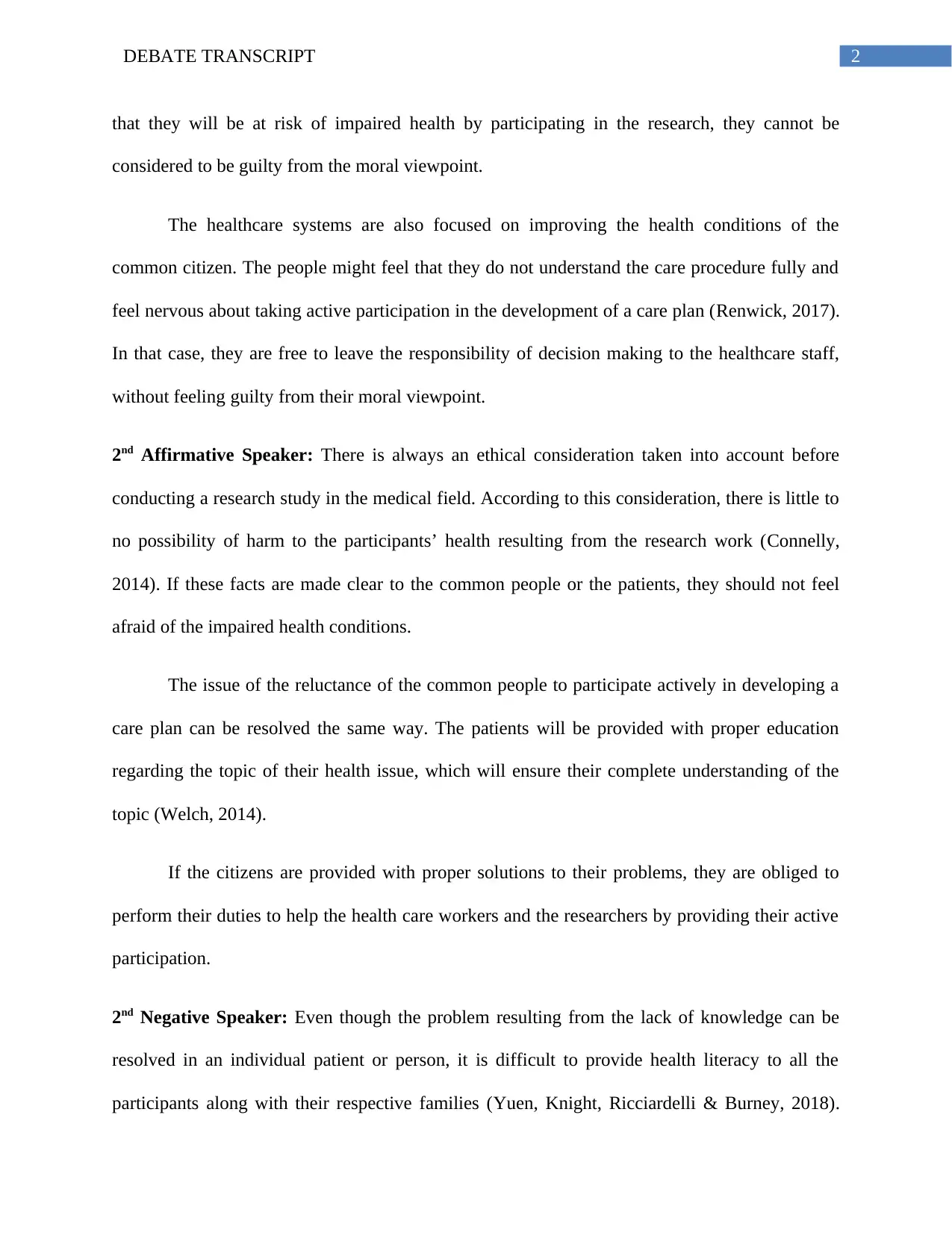
2DEBATE TRANSCRIPT
that they will be at risk of impaired health by participating in the research, they cannot be
considered to be guilty from the moral viewpoint.
The healthcare systems are also focused on improving the health conditions of the
common citizen. The people might feel that they do not understand the care procedure fully and
feel nervous about taking active participation in the development of a care plan (Renwick, 2017).
In that case, they are free to leave the responsibility of decision making to the healthcare staff,
without feeling guilty from their moral viewpoint.
2nd Affirmative Speaker: There is always an ethical consideration taken into account before
conducting a research study in the medical field. According to this consideration, there is little to
no possibility of harm to the participants’ health resulting from the research work (Connelly,
2014). If these facts are made clear to the common people or the patients, they should not feel
afraid of the impaired health conditions.
The issue of the reluctance of the common people to participate actively in developing a
care plan can be resolved the same way. The patients will be provided with proper education
regarding the topic of their health issue, which will ensure their complete understanding of the
topic (Welch, 2014).
If the citizens are provided with proper solutions to their problems, they are obliged to
perform their duties to help the health care workers and the researchers by providing their active
participation.
2nd Negative Speaker: Even though the problem resulting from the lack of knowledge can be
resolved in an individual patient or person, it is difficult to provide health literacy to all the
participants along with their respective families (Yuen, Knight, Ricciardelli & Burney, 2018).
that they will be at risk of impaired health by participating in the research, they cannot be
considered to be guilty from the moral viewpoint.
The healthcare systems are also focused on improving the health conditions of the
common citizen. The people might feel that they do not understand the care procedure fully and
feel nervous about taking active participation in the development of a care plan (Renwick, 2017).
In that case, they are free to leave the responsibility of decision making to the healthcare staff,
without feeling guilty from their moral viewpoint.
2nd Affirmative Speaker: There is always an ethical consideration taken into account before
conducting a research study in the medical field. According to this consideration, there is little to
no possibility of harm to the participants’ health resulting from the research work (Connelly,
2014). If these facts are made clear to the common people or the patients, they should not feel
afraid of the impaired health conditions.
The issue of the reluctance of the common people to participate actively in developing a
care plan can be resolved the same way. The patients will be provided with proper education
regarding the topic of their health issue, which will ensure their complete understanding of the
topic (Welch, 2014).
If the citizens are provided with proper solutions to their problems, they are obliged to
perform their duties to help the health care workers and the researchers by providing their active
participation.
2nd Negative Speaker: Even though the problem resulting from the lack of knowledge can be
resolved in an individual patient or person, it is difficult to provide health literacy to all the
participants along with their respective families (Yuen, Knight, Ricciardelli & Burney, 2018).
⊘ This is a preview!⊘
Do you want full access?
Subscribe today to unlock all pages.

Trusted by 1+ million students worldwide
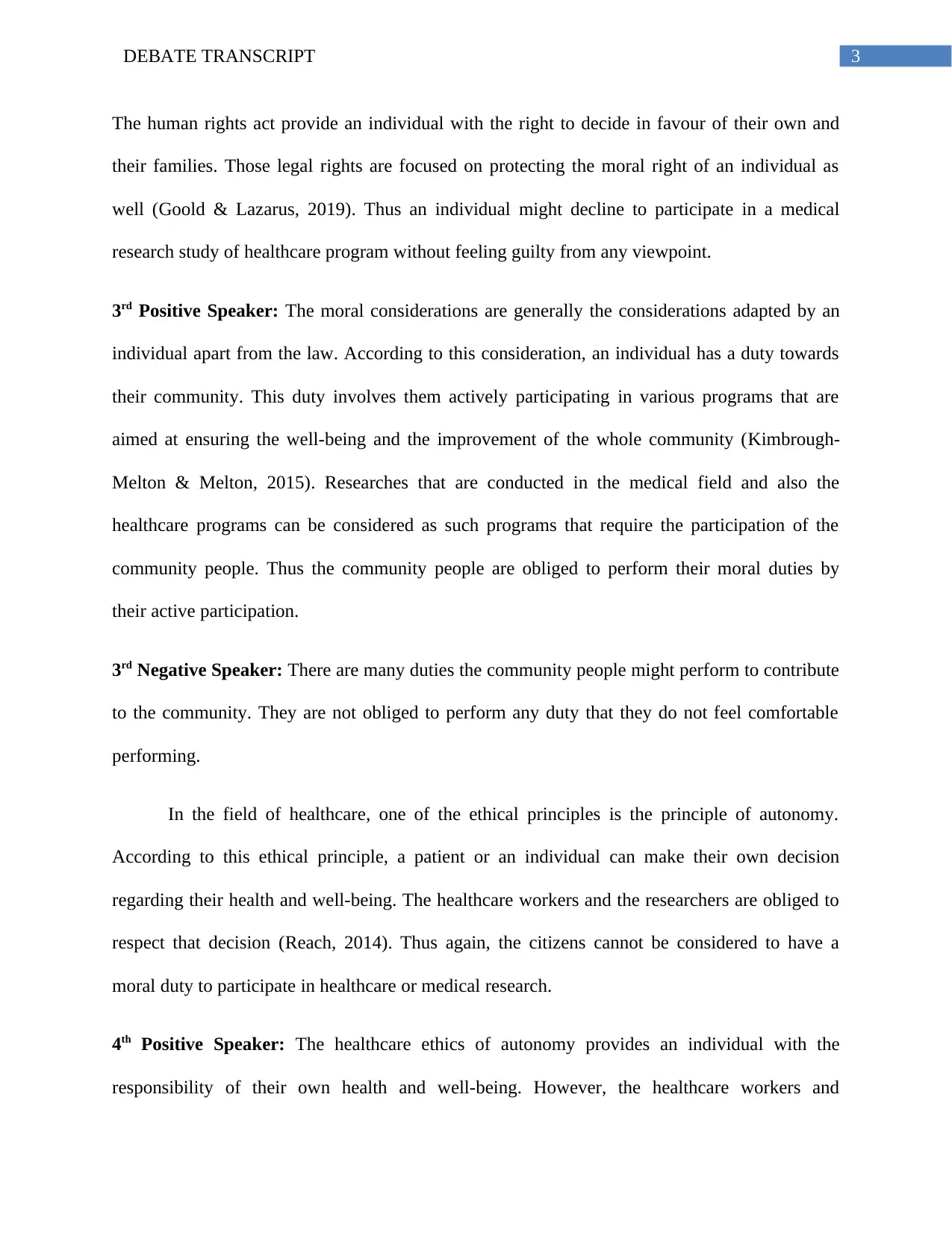
3DEBATE TRANSCRIPT
The human rights act provide an individual with the right to decide in favour of their own and
their families. Those legal rights are focused on protecting the moral right of an individual as
well (Goold & Lazarus, 2019). Thus an individual might decline to participate in a medical
research study of healthcare program without feeling guilty from any viewpoint.
3rd Positive Speaker: The moral considerations are generally the considerations adapted by an
individual apart from the law. According to this consideration, an individual has a duty towards
their community. This duty involves them actively participating in various programs that are
aimed at ensuring the well-being and the improvement of the whole community (Kimbrough-
Melton & Melton, 2015). Researches that are conducted in the medical field and also the
healthcare programs can be considered as such programs that require the participation of the
community people. Thus the community people are obliged to perform their moral duties by
their active participation.
3rd Negative Speaker: There are many duties the community people might perform to contribute
to the community. They are not obliged to perform any duty that they do not feel comfortable
performing.
In the field of healthcare, one of the ethical principles is the principle of autonomy.
According to this ethical principle, a patient or an individual can make their own decision
regarding their health and well-being. The healthcare workers and the researchers are obliged to
respect that decision (Reach, 2014). Thus again, the citizens cannot be considered to have a
moral duty to participate in healthcare or medical research.
4th Positive Speaker: The healthcare ethics of autonomy provides an individual with the
responsibility of their own health and well-being. However, the healthcare workers and
The human rights act provide an individual with the right to decide in favour of their own and
their families. Those legal rights are focused on protecting the moral right of an individual as
well (Goold & Lazarus, 2019). Thus an individual might decline to participate in a medical
research study of healthcare program without feeling guilty from any viewpoint.
3rd Positive Speaker: The moral considerations are generally the considerations adapted by an
individual apart from the law. According to this consideration, an individual has a duty towards
their community. This duty involves them actively participating in various programs that are
aimed at ensuring the well-being and the improvement of the whole community (Kimbrough-
Melton & Melton, 2015). Researches that are conducted in the medical field and also the
healthcare programs can be considered as such programs that require the participation of the
community people. Thus the community people are obliged to perform their moral duties by
their active participation.
3rd Negative Speaker: There are many duties the community people might perform to contribute
to the community. They are not obliged to perform any duty that they do not feel comfortable
performing.
In the field of healthcare, one of the ethical principles is the principle of autonomy.
According to this ethical principle, a patient or an individual can make their own decision
regarding their health and well-being. The healthcare workers and the researchers are obliged to
respect that decision (Reach, 2014). Thus again, the citizens cannot be considered to have a
moral duty to participate in healthcare or medical research.
4th Positive Speaker: The healthcare ethics of autonomy provides an individual with the
responsibility of their own health and well-being. However, the healthcare workers and
Paraphrase This Document
Need a fresh take? Get an instant paraphrase of this document with our AI Paraphraser
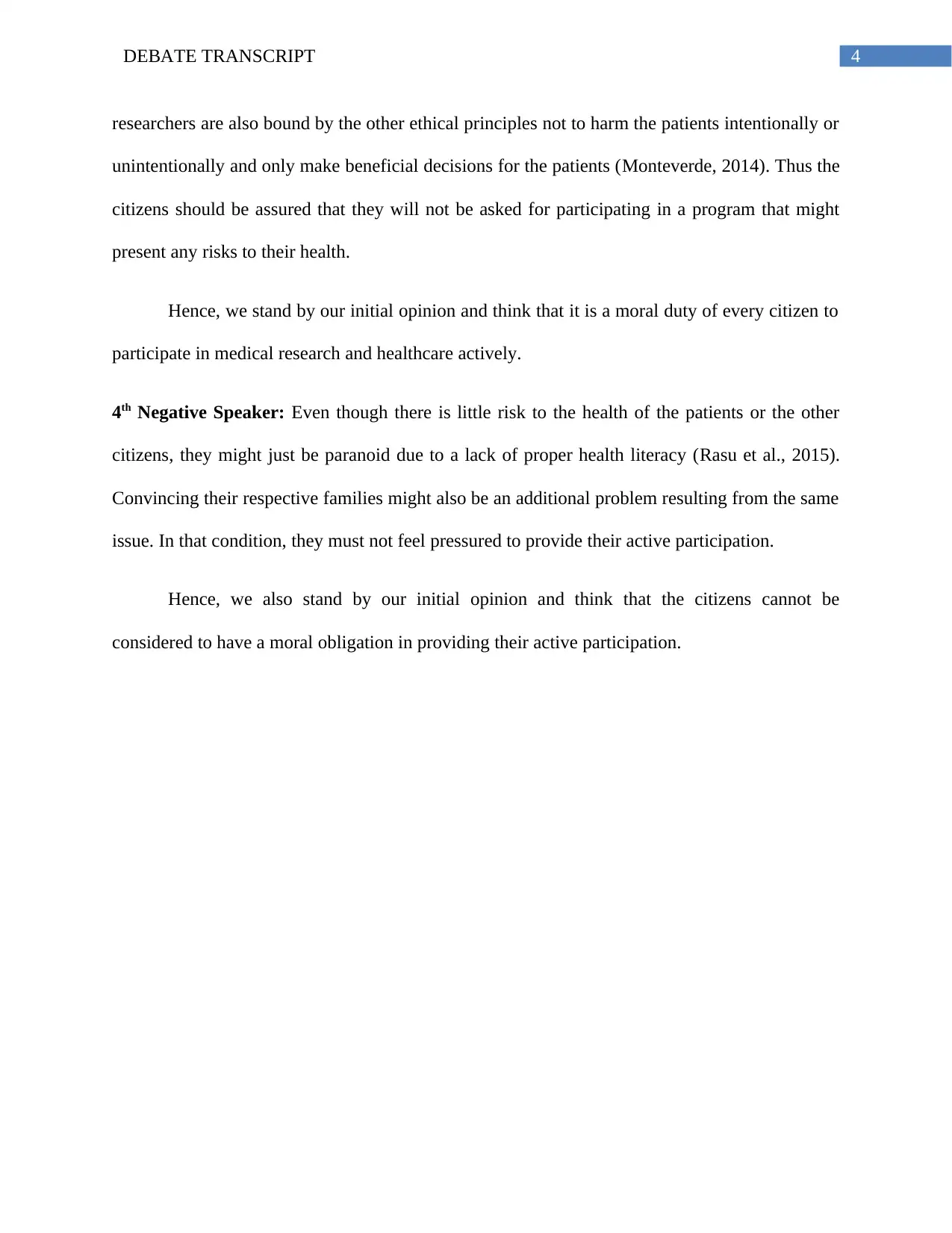
4DEBATE TRANSCRIPT
researchers are also bound by the other ethical principles not to harm the patients intentionally or
unintentionally and only make beneficial decisions for the patients (Monteverde, 2014). Thus the
citizens should be assured that they will not be asked for participating in a program that might
present any risks to their health.
Hence, we stand by our initial opinion and think that it is a moral duty of every citizen to
participate in medical research and healthcare actively.
4th Negative Speaker: Even though there is little risk to the health of the patients or the other
citizens, they might just be paranoid due to a lack of proper health literacy (Rasu et al., 2015).
Convincing their respective families might also be an additional problem resulting from the same
issue. In that condition, they must not feel pressured to provide their active participation.
Hence, we also stand by our initial opinion and think that the citizens cannot be
considered to have a moral obligation in providing their active participation.
researchers are also bound by the other ethical principles not to harm the patients intentionally or
unintentionally and only make beneficial decisions for the patients (Monteverde, 2014). Thus the
citizens should be assured that they will not be asked for participating in a program that might
present any risks to their health.
Hence, we stand by our initial opinion and think that it is a moral duty of every citizen to
participate in medical research and healthcare actively.
4th Negative Speaker: Even though there is little risk to the health of the patients or the other
citizens, they might just be paranoid due to a lack of proper health literacy (Rasu et al., 2015).
Convincing their respective families might also be an additional problem resulting from the same
issue. In that condition, they must not feel pressured to provide their active participation.
Hence, we also stand by our initial opinion and think that the citizens cannot be
considered to have a moral obligation in providing their active participation.
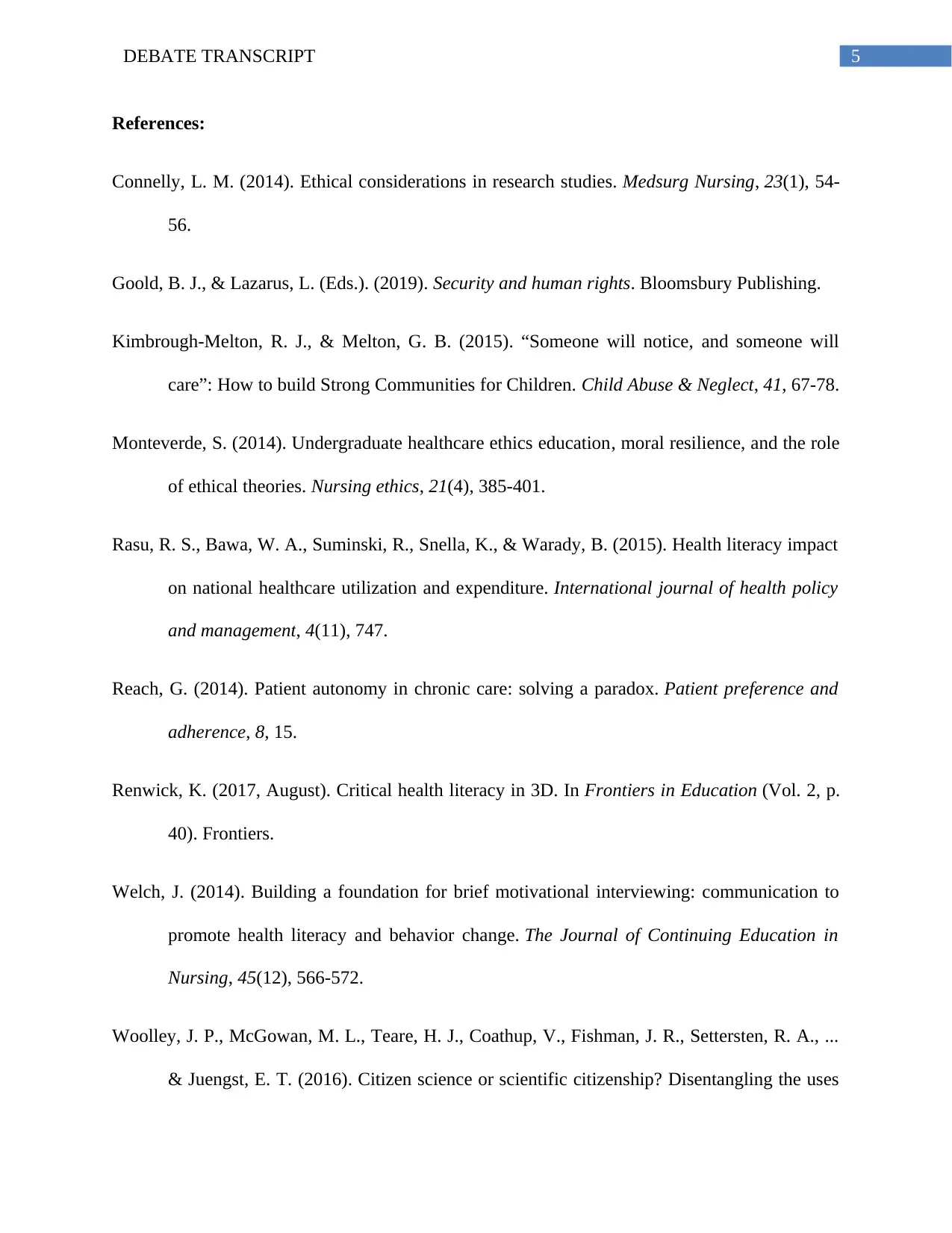
5DEBATE TRANSCRIPT
References:
Connelly, L. M. (2014). Ethical considerations in research studies. Medsurg Nursing, 23(1), 54-
56.
Goold, B. J., & Lazarus, L. (Eds.). (2019). Security and human rights. Bloomsbury Publishing.
Kimbrough-Melton, R. J., & Melton, G. B. (2015). “Someone will notice, and someone will
care”: How to build Strong Communities for Children. Child Abuse & Neglect, 41, 67-78.
Monteverde, S. (2014). Undergraduate healthcare ethics education, moral resilience, and the role
of ethical theories. Nursing ethics, 21(4), 385-401.
Rasu, R. S., Bawa, W. A., Suminski, R., Snella, K., & Warady, B. (2015). Health literacy impact
on national healthcare utilization and expenditure. International journal of health policy
and management, 4(11), 747.
Reach, G. (2014). Patient autonomy in chronic care: solving a paradox. Patient preference and
adherence, 8, 15.
Renwick, K. (2017, August). Critical health literacy in 3D. In Frontiers in Education (Vol. 2, p.
40). Frontiers.
Welch, J. (2014). Building a foundation for brief motivational interviewing: communication to
promote health literacy and behavior change. The Journal of Continuing Education in
Nursing, 45(12), 566-572.
Woolley, J. P., McGowan, M. L., Teare, H. J., Coathup, V., Fishman, J. R., Settersten, R. A., ...
& Juengst, E. T. (2016). Citizen science or scientific citizenship? Disentangling the uses
References:
Connelly, L. M. (2014). Ethical considerations in research studies. Medsurg Nursing, 23(1), 54-
56.
Goold, B. J., & Lazarus, L. (Eds.). (2019). Security and human rights. Bloomsbury Publishing.
Kimbrough-Melton, R. J., & Melton, G. B. (2015). “Someone will notice, and someone will
care”: How to build Strong Communities for Children. Child Abuse & Neglect, 41, 67-78.
Monteverde, S. (2014). Undergraduate healthcare ethics education, moral resilience, and the role
of ethical theories. Nursing ethics, 21(4), 385-401.
Rasu, R. S., Bawa, W. A., Suminski, R., Snella, K., & Warady, B. (2015). Health literacy impact
on national healthcare utilization and expenditure. International journal of health policy
and management, 4(11), 747.
Reach, G. (2014). Patient autonomy in chronic care: solving a paradox. Patient preference and
adherence, 8, 15.
Renwick, K. (2017, August). Critical health literacy in 3D. In Frontiers in Education (Vol. 2, p.
40). Frontiers.
Welch, J. (2014). Building a foundation for brief motivational interviewing: communication to
promote health literacy and behavior change. The Journal of Continuing Education in
Nursing, 45(12), 566-572.
Woolley, J. P., McGowan, M. L., Teare, H. J., Coathup, V., Fishman, J. R., Settersten, R. A., ...
& Juengst, E. T. (2016). Citizen science or scientific citizenship? Disentangling the uses
⊘ This is a preview!⊘
Do you want full access?
Subscribe today to unlock all pages.

Trusted by 1+ million students worldwide
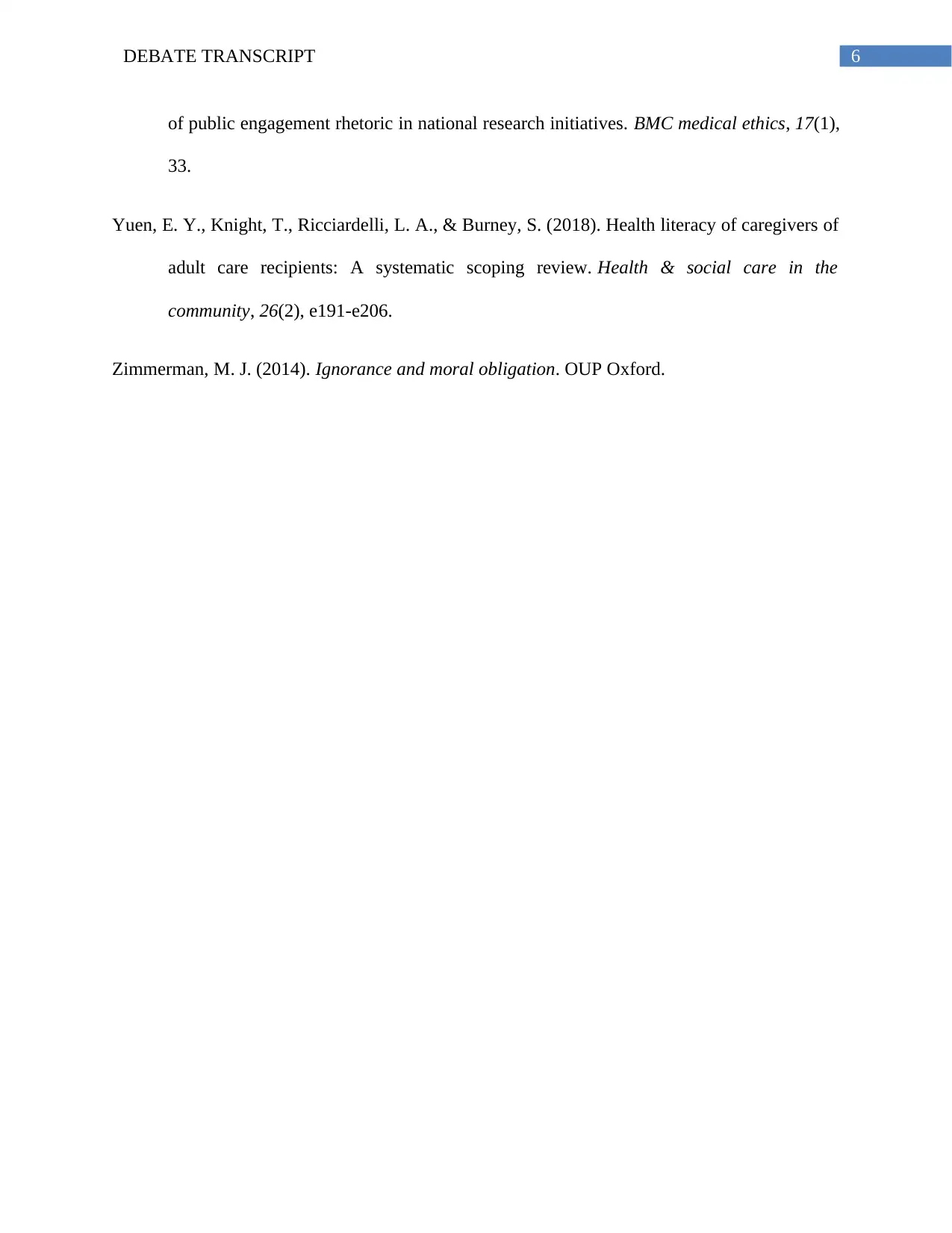
6DEBATE TRANSCRIPT
of public engagement rhetoric in national research initiatives. BMC medical ethics, 17(1),
33.
Yuen, E. Y., Knight, T., Ricciardelli, L. A., & Burney, S. (2018). Health literacy of caregivers of
adult care recipients: A systematic scoping review. Health & social care in the
community, 26(2), e191-e206.
Zimmerman, M. J. (2014). Ignorance and moral obligation. OUP Oxford.
of public engagement rhetoric in national research initiatives. BMC medical ethics, 17(1),
33.
Yuen, E. Y., Knight, T., Ricciardelli, L. A., & Burney, S. (2018). Health literacy of caregivers of
adult care recipients: A systematic scoping review. Health & social care in the
community, 26(2), e191-e206.
Zimmerman, M. J. (2014). Ignorance and moral obligation. OUP Oxford.
1 out of 7
Your All-in-One AI-Powered Toolkit for Academic Success.
+13062052269
info@desklib.com
Available 24*7 on WhatsApp / Email
![[object Object]](/_next/static/media/star-bottom.7253800d.svg)
Unlock your academic potential
Copyright © 2020–2025 A2Z Services. All Rights Reserved. Developed and managed by ZUCOL.
